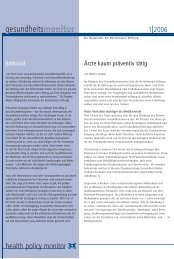The 2nd HPD report - Health Policy Monitor
The 2nd HPD report - Health Policy Monitor
The 2nd HPD report - Health Policy Monitor
- TAGS
- health
- policy
- monitor
- www.hpm.org
Create successful ePaper yourself
Turn your PDF publications into a flip-book with our unique Google optimized e-Paper software.
Introduction<br />
This second issue of “<strong>Health</strong> <strong>Policy</strong> Developments” pays special<br />
attention to three concurrent health policy topics, all of them high<br />
on health policy agendas in a variety of developed countries:<br />
– <strong>Health</strong> and aging<br />
– Pharmaceutical policies<br />
– Human resources and health<br />
While we describe current developments from the <strong>report</strong>ing period<br />
April through November 2003 in detail on our Web site,<br />
www.healthpolicymonitor.org, we chose a somewhat different<br />
approach to present the findings from the second survey in Issue<br />
2. Criteria for selection were scope, continuity and presence in<br />
public debate during and beyond the <strong>report</strong>ing period proper.<br />
With this in mind, we looked at topics from the first and the<br />
second survey independently of their present stage of development<br />
or implementation. Some of the case studies—drawn, for<br />
example, from Germany, France, the United States, Australia and<br />
Canada—may offer test cases or model solutions for the same<br />
debates elsewhere.<br />
Finally, in line with the <strong>Health</strong> <strong>Policy</strong> Network’s news and<br />
monitoring function, the last chapter follows up on developments<br />
<strong>report</strong>ed in Issue 1/2003, particularly on funding, quality and<br />
coordination of health care services. <strong>The</strong> Newsflash also gives a<br />
brief overview of key health policy reform in our new network<br />
member country, the Republic of Korea.<br />
<strong>The</strong> very success of increasingly large numbers of people<br />
living to a respectable seniority raises challenging questions for<br />
communities and policy makers. Throughout the world, the proportion<br />
of older people (65 years or older), and especially that of<br />
17<br />
<strong>Health</strong> and aging






